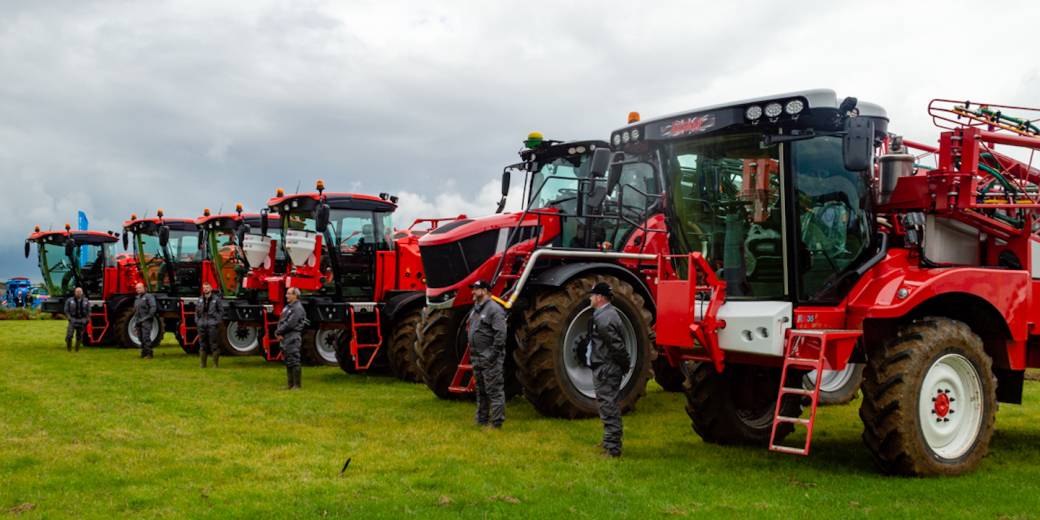Insight from a very soggy Cereals 2019
11 July, 2019 Reading: 4:40 mins
It’s now a month on from Cereals 2019 – the arable industry’s leading technical event which brings together farmers, agronomists and others working in agriculture from all over the country. Key issues facing the industry are addressed by leading speakers in sponsored stages, and technological innovations are unveiled at the hundreds of stands that are neatly lined up in the huge field. This year’s event was also an excellent opportunity for the KISS team to catch up with old friends and gain some invaluable insight in the agri-tech sector.

It’s now a month on from Cereals 2019 – the arable industry’s leading technical event which brings together farmers, agronomists and others working in agriculture from all over the country. Key issues facing the industry are addressed by leading speakers in sponsored stages, and technological innovations are unveiled at the hundreds of stands that are neatly lined up in the huge field. This year’s event was also an excellent opportunity for the KISS team to catch up with old friends and gain some invaluable insight in the agri-tech sector.
The lead-up to Cereals, this year held in Lincolnshire, was exceptionally wet. Heavy rain the days before left parts of the site treacherously muddy - remarkably, these conditions meant that the event was extremely well attended. In poor weather conditions crops are not sprayed so no one could do anything on the farm, which meant a bumper turnout at Cereals!
Key highlights for our team at Cereals 2019:
1. Life after neonicotinoid seed treatments
Conversations around the challenges of ‘life after neonicotinoids’ dominated a lot of our time. Since neonicotinoids were banned in 2018, the arable farming industry has had to find a suitable alternative and this primarily has focussed on spraying pyrethroid pesticides in order to deal with the damaging effects of cabbage stem flea beetles. Therefore, many at Cereals were looking for advice about improving the efficiency of spraying or alternative techniques to keep the destructive pests under control.
2. The Voluntary Initiative ‘Knowledge Trail’
The Voluntary Initiative (VI) works with farmers across the UK to promote best practice in pesticide use by adopting an Integrated Pest Management (IPM) approach. This industry-led initiative is a requirement for anyone using professional pesticides – IPM recommends a range of techniques including the use of crop rotation, monitoring of harmful pests and targeted application of pesticides.
At Cereals, the VI were part of the Knowledge Trail which allowed farmers to earn Continuing Professional Development points. The key points in the VI questionnaire focussed on the campaigns that they are currently running, Think Water and BeeConnected.
3. Upskilling farmers
At the AHDB stand we met a spokesperson for the AHDB Skills Programme. This scheme aims to provide a solution for two key challenges currently facing the agricultural industry: getting people into farming and keeping people in farming. AHDB have identified that there is a lack of knowledge among farmers surrounding business management and communication and its Skills Programme has been developed to try and remedy this gap in understanding to build a highly skilled, professional agricultural workforce.
4. Soil quality
Soil management was a particularly key topic – soil health and structure are the essential basis of any healthy crop, and it was highlighted in the Government’s 25-year environment plan.
NIAB provided an invaluable source of information at their enormous soil pit which was 20m long, 1.5m deep and offered a ‘worm’s eye’ view of soil structure and the root systems of various cover crops, cereals and common arable weeds. The soil pit gave farmers an opportunity to see exactly what was going on below ground, and the effect of different crops and cover crops, different cultivation methods and crop agronomy on soil structure.
As the agricultural sector works to achieve the targets set out in the 25-year plan, the management of healthy soil is going to become increasingly important, as it underpins, quite literally, all other farming practices. Goals such as protecting water sources, mitigating the impacts of climate change and enhancing biosecurity which are set out in the government’s plans, all begin with well-maintained soil. NIAB’s soil pit was therefore an essential stop for many at Cereals this year.
5. Innovation
Cereals was an incredible showcase of innovation, with hands-free machinery, the promise of new active ingredients and discussions about how AI, remote sensing and machine learning taking place in the Innovation and Technology theatre.
Innovations in sprayer nozzles were demonstrated at many stands all with the main aim of reducing drift and increasing accuracy when spraying crops – essential elements of good stewardship because of the urgency to reduce the amount of chemical pesticides being discovered in ground water. To ensure important chemicals remain available, they must be applied carefully with the appropriate equipment. Attendees at Cereals were therefore very engaged in discussions about the innovations that are now available to improve application.
Overall, many of the conversations at Cereals revolved around sustainability. There was a commonly held fear that farmers might be paralysed by encroaching regulations on crop protection products. Implementing best practice is one of the best ways to increase environmental sustainability and ensure that some important chemicals remain available.
Clearly best practice will be made possible by continued training to upskill farmers and support their professional development. Innovations in the agricultural sector will transform farming practices and support sustainability. Events such as Cereals will become increasingly important in providing thought leadership to farmers as they adjust to seismic shifts within agriculture and we’re looking forward to next year’s event – but with some added sunshine please!
